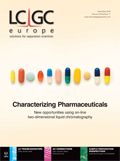41st International Symposium on Capillary Chromatography & 14th GC×GC Symposium
The 41st International Symposium on Capillary Chromatography (ISCC) and the 14th GC×GC Symposium will return to the city of Fort Worth “Gateway to the West”, Texas, USA, in 2017.
Photo Credit: Leena Robinson/Shutterstock.com

The 41st International Symposium on Capillary Chromatography (ISCC) and the 14th GC×GC Symposium will return to the city of Fort Worth “Gateway to the West”, Texas, USA, in 2017. Following the success of 2015’s conferences, the US counterparts to the highly acclaimed biannual Riva del Garda (Italy) conference series will again return to the historic Hilton Fort Worth from 14–19 May 2017.
The premier symposia for pressure and electrodriven microcolumn separations, comprehensive multidimensional chromatography, and related techniques, ISCC & GC×GC provide a rich forum for fundamentals and applications of widely used analytical technologies. Attendees can meet and have discussions with worldârenowned researchers and share their research work through oral and poster presentations. Strong technical programmes will be supplemented by short courses and vendor seminars, a fun social programme, and an exhibition by leading manufacturers who will present innovative new software and hardware solutions.
Short courses will begin on Sunday 14 May 2017 and will include:
- GC×GC (full-day course by John Dimandja and Phillip Marriott)
- Sample preparation (half-day course by Nick Snow and Harold McNair)
- Basic HPLC (half-day course by Lee Polite, Axion Labs)
- Ionic liquids (half-day course by Len Sidisky and Dan Armstrong).
The invited speaker list includes a plenary talk from Richard Zare of Stanford University, California, USA, as well as talks from Jared Anderson, Sandy Dasgupta, Gert Desmet, Norman Dovichi, Ziad El Rassi, Shaorong Liu, Mike Ramsey, Dwight Stoll, Mary Wirth, and Adam Woolley, among others. A wide range of fundamentals and state-of-the-art applications of liquid and gas phase capillary-scale separation technologies, and associated detection techniques, will be conveyed by these and other speakers. For a complete list of invited speakers please visit our website.
Also featured will be a young scientists session to highlight contributions from up-and-coming chromatographers. A large poster session is also expected, and prizes, generously provided by conference sponsors, will be awarded for the best poster presentations. The Marcel Golay Award and the Leslie Ettre Award, both sponsored by PerkinElmer, will be awarded and accompanied by featured acceptance lectures.
Microcolumn and multidimensional analytical techniques enable work in many different areas. As such, the symposia will place a significant focus on comprehensive two-dimensional liquid chromatography (LC×LC) and its development as a growing field of interest. Holding the conference in Texas also means that a significant emphasis can be placed on analytical sciences related to energy, petroleum, and resource development. Special sessions will ensure that attendees learn the most recent research developments in these fields. The symposia will also provide exceptional coverage of environmental, food science, pharmaceutical, bioanalytical, and petrochemical research.
To round out an extraordinary conference experience, a number of social events have been organized, including a trip to the Ballpark at Arlington to see a Texas Rangers baseball game on Sunday 14 May 2017 (versus the Oakland Athletics). A trip to the Stockyards for a traditional Texas rodeo will be planned for Friday 19 May 2017 with reserved seating and special events arranged for conference attendees. A taste of Texas will be on offer at the conference banquet on Wednesday 17 May 2017, which will include live music and authentic cuisine in the iconic Reata. This conference series has historically offered exceptional social events, and this meeting will live up to that expectation.
The organizers hope to see you in Texas in May - to share in these meetings and to enjoy a rich scientific and vibrant social programme with all of the hospitality of the “Gateway to the West”.
For more information, please visit: www.isccgcxgc.com

New TRC Facility Accelerates Innovation and Delivery
April 25th 2025We’ve expanded our capabilities with a state-of-the-art, 200,000 sq ft TRC facility in Toronto, completed in 2024 and staffed by over 100 PhD- and MSc-level scientists. This investment enables the development of more innovative compounds, a broader catalogue and custom offering, and streamlined operations for faster delivery. • Our extensive range of over 100,000 high-quality research chemicals—including APIs, metabolites, and impurities in both native and stable isotope-labelled forms—provides essential tools for uncovering molecular disease mechanisms and exploring new opportunities for therapeutic intervention.
New Guide: Characterising Impurity Standards – What Defines “Good Enough?”
April 25th 2025Impurity reference standards (IRSs) are essential for accurately identifying and quantifying impurities in pharmaceutical development and manufacturing. Yet, with limited regulatory guidance on how much characterisation is truly required for different applications, selecting the right standard can be challenging. To help, LGC has developed a new interactive multimedia guide, packed with expert insights to support your decision-making and give you greater confidence when choosing the right IRS for your specific needs.

.png&w=3840&q=75)

.png&w=3840&q=75)



.png&w=3840&q=75)



.png&w=3840&q=75)










